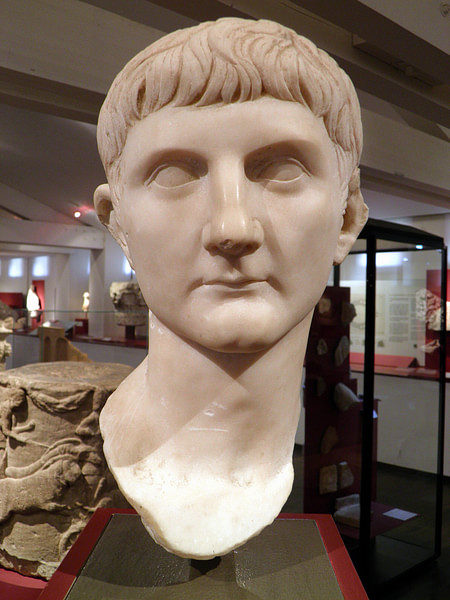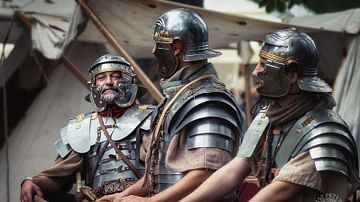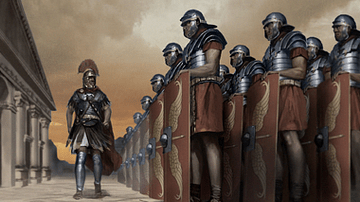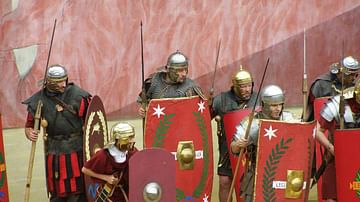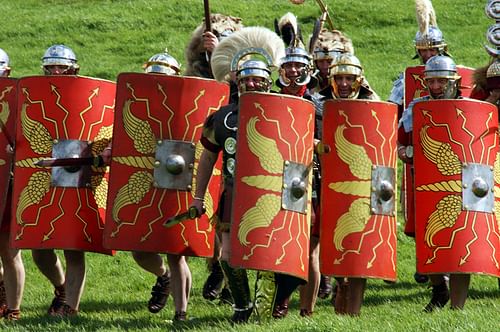
Legio I Germanica was a Roman legion that won acclaim early under Augustus (27 BCE - 14 CE) but was stripped of its title for cowardice. Stationed on the Lower Rhine, the legion mutinied in 14 CE and then faced disgrace when it turned traitor to Rome during the Batavian Revolt. It was disbanded by Vespasian in 70 CE.
Origin
Like many legions of the period, I Germanica’s origin is in question. Some assert that Legio I Germanica was one of Pompey’s (106-48 BCE) elite legions and fought with him against Julius Caesar (100-44 BCE) at the Battle of Pharsalus (48 BCE), and participated in the Battle of Thapsus (46 BCE), and the Battle of Munda (45 BCE) during the Civil War. There is also the claim that it was formed by the Roman army commander and governor Gaius Vibius Pansa Caetronianus to fight against Mark Antony (83-30 BCE). However, most sources maintain that Octavian’s 1st legion, raised around 48 BCE, was a descendant of Pompey’s 1st and fought with the future Roman emperor at the Battle of Mutina (43 BCE), the Battle of Philippi (42 BCE), and later participated in the Cantabrian Wars (29-19 BCE). It was the legion’s conduct during the wars that won it the title of Augusta. However, the legion was stripped of its title by the Roman commander Marcus Agrippa for either cowardice or mutinous behavior when a rebellion resurfaced in the Cantabrian Mountains.
Although some believe the legion was disbanded, Legio I reappears around 19 BCE in Gaul where it had been either transferred or reformed by the then-governor future emperor Tiberius (r. 14-37 CE). In 6 CE the legion was briefly stationed at Colonia Agrippinensis (modern Cologne) on the Lower Rhine with Legio V Alaudae until it was transferred to Bonna (modern Bonn) after the disastrous defeat of Publius Quinctilius Varus at the Battle of Teutoburg Forest in 9 CE. Later, it was part of a vast army alongside eleven other legions commanded by Gaius Saturninus for Tiberius’s aborted campaign against the Marcomanni, but the assault was discontinued due to the Pannonian Revolt.
Mutiny
In 14 CE, following the death of Augustus, the legion participated in a mutiny led by Legio V Alaudae and Legio XXI Rapax. The legions’ complaints were twofold: they were concerned not only about conditions of service and pay but they were also hopeful that the Roman commander Germanicus would replace his uncle Tiberius on the throne. Unlike his predecessor Augustus, Tiberius was not interested in expansion. However, no Roman legionary - the pride of the Roman military - wanted to sit idly in the camp. According to historian Barry Strauss in his Ten Caesars, the beloved Germanicus, wanted to regain German territory east of the Rhine, but Tiberius did not. The emperor saw nothing to gain by conquering the area; there were no riches only a border to defend. Germanicus’ recall in 16 CE ended any future attempt to win back the territory.
In his Annals Roman historian Tacitus (c. 56 - c. 118 CE) wrote of the legions’ initial concerns in the mutiny:
… the legions of Germany rose in mutiny, with a fury proportioned to their greater numbers, in the confident hope that Germanicus Caesar would not be able to endure another’s supremacy and would offer himself to the legions, whose strength would carry everything before it. (Annals I. 31)
The legions of the Rhine frontier were in disarray, and Legio I was drawn into the disorder. Tacitus wrote that the armies of the Upper Rhine under their commander Gaius Silius watched the mutiny from the outside while those of the Lower Rhine, under the command of Aulus Caecina "…fell into a frenzy which had its beginning in the men of the twenty-first and fifth legions, and into which the first and twentieth were also drawn." (I. 31) While Germanicus was able to resolve some of the demands, the 5th and 21st refused to comply. One of the legions to be appeased was Legio I. Tacitus wrote:
The first and twentieth legions were led back by their officer Caecina to the canton of the Ubii, marching in disgrace, since sums of money which had been extorted from the general were carried among the eagles and standards. (I. 37)
The 2nd, 13th, 16th, and 14th legions soon accepted Germanicus’ proposal and took an oath of allegiance. However, tensions resurfaced when envoys from the Roman Senate arrived at camp.
Two legions, the first and twentieth, with veterans discharged and serving under a standard, were there in winter quarters. In the bewilderment of terror and conscious guilt they were penetrated by an apprehension that persons had come at the Senate’s orders to cancel the concessions they had extorted by mutiny. (I. 39)
Fearing the worse, the legions stormed the tent of the chief envoy Munatius Plancus. The legions demanded the imperial standard kept in Germanicus’ quarters, and then, having made their demands, "dragged Caesar from his bed, and forced him by menaces of death to give up the standard." (I. 39) Luckily, he was saved by the eagle-bearer Calpurnius.
The following morning Germanicus entered the camp. After dismissing the envoys, he addressed the crowd of legionaries. He spoke of Augustus fighting at the Battle of Actium and Julius Caesar who stopped a mutiny with a single word. He spoke directly to the two legions that had stormed and threatened the chief envoy.
First and twentieth legions, you who received your standards from Tiberius, you, men of the twentieth who have shared with me so many battles and have been enriched with so many rewards, is this not a fine gratitude with which you are repaying your general? (I. 42)
After his speech, the legions were repentant "… as suppliants confessing that his reproaches were true, they implored him to punish the guilty, pardon those who had erred, and lead them against the enemy." (I. 44) The guilty stood on a raised platform and were cut to pieces. Having resolved the situation with the 1st and 20th, he turned his attention to the 5th and 21st legions that were stationed 60 miles away at Vetera (modern Xanten). He proposed a number of counter-measures and even threatened to execute the mutineers unless Caecina punished them. Their commander and a handful of loyal legionaries entered the mutineers’ tents and killed the offenders. In the end, he was able to restore loyalty to the unpopular Tiberius.
Campaigns in Germany
Legio I was able to redeem itself with its participation in Germanicus’ campaigns in Germany. In 16 CE, Legio Prima served under the command of Caecina at the Battle of Long Bridges against Arminius and his army of German tribes. Caecina commanded four legions: Legio I, V Alaudae, Legio XX, and XXI Rapax. During the battle, the commander was thrown from his horse and pieced by German javelins. The legionaries of the 1st Legion surrounded their fallen commander and fought off his attackers. Although some sources disagree on the date and occasion of the reward, due to their bravery shown throughout the battle, the legion was awarded the title of Germanica. The newly named legion continued to demonstrate itself in battle. In 21 CE, under the command of the governor of Upper Germany Gaius Silius, the legion along with V Alaudae, XX Valeria Victrix and XXI Rapax fought off a rebellion of the Gallic tribes Treveri and Turoni led by Julius Florus and Julius Sacrovir.

Little is heard from the legion until 67 CE when it was sent against Julius Vindex, the governor of Roman Gaul, who led a revolt against Emperor Nero (r. 54-68 CE). Vindex favored the claims to the throne of the governor of Spain, Servius Galba. While Vindex was defeated, the death of Nero in 68 CE would not only bring Galba (r. 68-69 CE) to the throne but throw the Roman Empire into chaos and usher in the Year of the Four Emperors. Legions across the Rhine were thrown into a state of confusion, wondering whether or not to support the new emperor with an oath of allegiance. In his Histories, Tacitus wrote of the reluctance of many of the legions from taking the oath to support Galba’s claim to the throne:
Yet it was to Galba that the legions of Lower Germany took the oath of fidelity annually administered on the first of January. It was done after long delay … And even in the various legions there was a difference of feeling. The soldiers of the 1st and the 5th were so mutinous, that some of them threw stones at the images of Galba. (I. 55)
Year of Four Emperors
Real chaos occurred with the death of Galba in 69 CE at the hands of the Praetorian Guard. Legions were torn between supporting the new emperor Otho (r. 69 CE), the governor of Germania Inferior (Lower Germany) Vitellius (r. 69 CE), or the Roman commander and governor Vespasian (r. 69-79 CE) who had the support of eight legions. Like others on the Lower Rhine, I Germanica, under the command of Fabius Valens, supported Vitellius. At the Battle of Bedriacum, cohorts of I Germanica, along with IV Macedonica, V Alaudae, XV Primigenia and XXI Rapax, fought with Vitellius against Otho. With Otho’s suicide, Vitellius marched into Rome and was acclaimed the new emperor. Again, loyalties were questioned when the security of the emperor’s throne was challenged not only by Vespasian but also a rebellion led by Gaius Civilis, a former Roman commander of eight cohorts of Batavian auxiliary troops. The rebellion would bring the end of Vitellius and help put Vespasian on the throne. Civilis had a long-standing grudge against the emperor. At the onset of the rebellion he swore allegiance (albeit temporarily) to Vespasian.
Early in the revolt, German tribes attacked the Roman forces at Vetera (Xanten). Civilis and his Batavian cohorts volunteered to march as a relief force to the camp. However, when he arrived, he surprisingly turned and attacked the Roman forces. More auxiliaries soon defected and joined Civilis. When four cohorts of Batavian and Cananefates troops were marching to Italy, Civilis issued an order for them to turn around and join in the rebellion; they turned traitor and swore to Vespasian. Flaccus, the Roman commander of the Rhine legions at Mogontiacum (modern Mainz) had initially issued an order to Herennius Gallus, commander at Bonna, to stop them but then sent a second order to allow the tribes to pass. While the XVI Gallica remained in camp, I Germanica and six other cohorts, remaining loyal to Vitellius, proved their mettle, disobeyed the second order, and rushed out of the camp gates attempting to intercept the Batavians. The legion failed, suffering heavy casualties; the traitorous cohorts continued on their march unimpeded to join Civilis in his revolt. Later, I Germanica complained to Flaccus for his failure to give them adequate support, and Flaccus later admitted to his support of Vespasian.
Legio I Turns Traitor
The legion next appears after the death of Vitellius. The armies of Vitellius and Vespasian met at the Second Battle of Bedriacum where Vitellius' army was soundly defeated. The emperor tried to escape in disguise but was captured by Vespasian's men, and while pleading for his life, was dragged through the streets, tortured, killed. Again, the legions of the Rhine were reluctant to swear allegiance to the new emperor. With the continued fall of Roman fortresses and defection of the auxiliaries, Civilis controlled the Rhine, refusing to abandon his revolt even after Vespasian had become emperor. With that, he divorced himself from Vespasian and began a new war against Rome.
Many of those legions that had supported Vitellius remained reluctant to swear allegiance to Vespasian. The Roman commander Vocula of the XXII Primigenia, who had sworn to support Vespasian, had been cautioned that many of his legionaries were considering joining Civilis. He tried to convince his legionaires to remain loyal to Rome, but a I Germanica deserter named Aemilius Longinus entered the commander’s tent, pulled out his sword, and killed him.
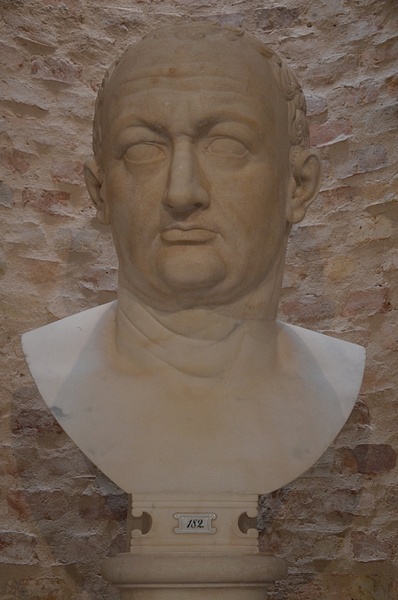
After the death of Vocula, legions such as I Germanica, IV Macedonica, XVI Gallica, and XVIII joined the Batavian Revolt of Civilis. However, during this time, Rome was not sitting idly and began forming an offense under the command of Quintus Petillius Cerialis. The two armies would meet at the Battles of Rigodolum and Trier. Prior to Rigodolum, it became obvious that Rome was mounting a formidable army; there was even talk among some of the rebels to sue for peace. Concerned for their future, I Germanica and XVI Gallica realized their mistake, defected back to the Romans, and swore allegiance to Vespasian. Cerialis promised that their past crimes would be forgotten. Tacitus wrote:
These men headstrong, cowardly and spiritless, as a mob without a leader always is, on the approval of Civilis, hastily took up arms, and as hastily, abandoned them, betook themselves in flight …. the men of the 1st, the 4th, and the 18th legions repenting of their conduct followed Vocula and again taking in his presence the oath of allegiance to Vespasian and were marched to the relief of Mogontiacum. (Histories, IV. 37)
The armies would meet for the last time at Vetera. While there was some rebel success, the end was assured, and when his men spoke of handing him over to the Romans, Civilis sought peace with Cerialis. His time after the revolt is one of those questions that go unanswered. As for I Germanica and the 18th, Vespasian was not as forgiving as Cerialis, and both legions, as well as IV Macedonica and XVI Gallica (reformed as XVI Flavia), were disbanded. There are some who claim I Germanica may have been absorbed into VII Gemina.

